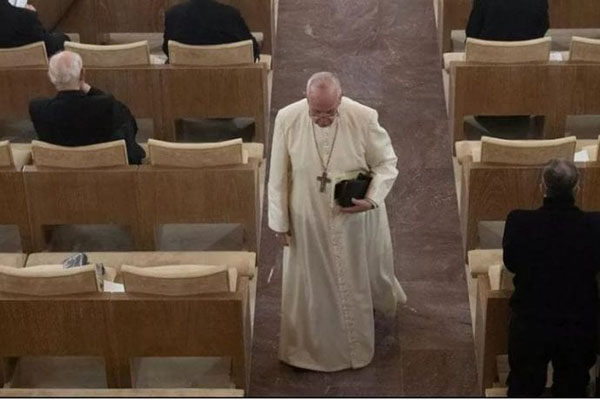
By John L. Allen
ROME (Crux) — Pope Francis was supposed to depart March 1 for his annual weeklong Lenten retreat with senior members of the Roman Curia. As has been custom since 2015, the get-away is being staged at a retreat center in the nearby hill town of Ariccia, about 45 minutes by car outside Rome.
As it turns out, however, the pontiff announced during his Sunday Angelus address that he wouldn’t make the trip this year but will follow it from Rome due to a cold with which he’s been struggling for several days.
Yet one could make the argument that Pope Francis doesn’t actually have to be in Ariccia or its “Casa Divin Maestro” (“House of the Divine Master”), because in many ways the experience already carries a distinctly Pope Francis “vibe.”
To begin with, the preacher for this year’s retreat is a fellow Jesuit, Italian Father Pietro Bovati, who’s the number two official at the Vatican’s Pontifical Biblical Institute. An expert in the Old Testament, Bovati is a former vice-rector of the Biblicum from 1997 to 2008, having entered the Jesuits in 1959, and writes occasional Biblical reflections for “Civiltà Cattolica,” the Jesuit-edited and semi-official Vatican journal.
He’s also been a consultor to the Congregation for the Doctrine of the Faith, the Vatican’s doctrinal watchdog agency, since 2014, which is now also led by a Jesuit – Spanish Cardinal Luis Ladaria.
Fr. Bovati, 79, was a close friend and conversation partner with the late Jesuit Cardinal Carlo Maria Martini of Milan, who for decades was the “Great White Hope” of Catholicism’s liberal wing to ascend to the papacy. In his final interview just before his death in 2012, Cardinal Martini described the Catholic Church as “200 years out of date” and said, “Our culture has aged, our churches are big and empty, and the church bureaucracy rises up. The Church must admit its mistakes and begin a radical change, starting from the pope and the bishops.”
Many observers believe Pope Francis is leading the papacy which, under other circumstances, might have been conducted by Cardinal Martini. In that sense, having a disciple of Cardinal Martini lead this year’s retreat is fitting.
(By the way, it’s worth keeping an eye on what happens to Fr. Bovati next. There have been six previous preachers of the Lenten retreat under Pope Francis, two of who are now cardinals – Angelo De Donatis, the Vicar of Rome, and José Tolentino de Mendonça, Archivist and Librarian of the Holy Roman Church.)
More broadly, Ariccia itself is an apt setting for a Francis-sponsored event. In antiquity it was a center of the cult of the goddess Diana, or Artemis, among other things the protectress of childbirth, fitting for a pope who convened two Synods of Bishops on the family and who’s made the promotion of family life a cornerstone of his agenda.
Ariccia is also home to the sanctuary of Santa Maria di Galloro, the most popular Marian pilgrimage site in the region of Lazio that surrounds Rome. It’s home to the celebrated image of the of the Madonna of Galloro, which, since the seventeenth century, has been credited with a variety of miracles, including saving the town from a lethal outbreak of the plague in 1656. It’s a classical example of popular piety, which is Pope Francis’s preferred locus of theological insight, and also speaks to the Marian devotion that’s a defining trait for history’s first pontiff from Latin America.
(As an American footnote, Arricia is also home to the only overseas campus of Auburn University in Alabama, which rents out part of the city’s historic Palazzo Chigi designed by Bernini.)
As for the retreat center, the “Casa Divin Maestro” belongs to the Society of St. Paul founded by Blessed Giacomo Alberione in 1914, one of ten religious congregations and lay institutes founded by Alberione before he died in 1971. The “Padri Paulini,” as they’re known in Italy (not to be confused with the American Paulist Fathers), are devoted to diffusion of the Christian message through modern media.
Much like Pope Francis himself, the Paulini are maddeningly difficult to classify in terms of the politics of left v. right.
Their best-known magazine in Italy, “Famiglia Cristiana” – which has a circulation bigger than virtually any other circular in the country other than TV guides – is generally seen as leaning to the political left. In 2018, it carried a cover story about the populist and anti-immigrant Deputy Prime Minister at the time, Matteo Salvini, with the headline “Vade Retro,” invoking a Latin phrase from the Medieval ritual for exorcism.
Yet Father Gabriele Amorth, for decades the official exorcist of the Diocese of Rome who died in 2016, was also a Paolino. Fr. Amorth was openly critical of the post-Vatican II church for what he saw as a loss of faith, including naïveté about the reality of evil. To describe Fr. Amorth as “liberal” in any meaningful sense, either ecclesiastically or political, would be self-parodying.
Moreover, the “Casa Divin Maestro” itself has a history that undoubtedly appeals to Pope Francis. In 1967, for example, it was the setting for an historic meeting of Vatican II’s Commission for Christian Unity, led by the German Jesuit Cardinal Augustin Bea, a hero of Catholicism’s ecumenical movement which is also dear to this pope – and, needless to say, Cardinal Bea was also another fellow Jesuit.
To sum up, Pope Francis no doubt regrets not being in Arricia and its “Casa Divin Maestro” for the Lenten retreat this week. However, the Holy Father’s physical absence hardly means that his intellectual, spiritual and personal imprint won’t be felt.

Long live Francis! God bless him!
Wishing the Holy Father good health. God bless.